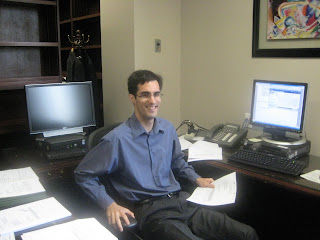 By Michael Snodgrass
By Michael Snodgrass I work in Buffalo (Go Bills!) for the Honorable Richard J. Arcara, Chief Judge for United States District Court for the Western District of New York. On a side note, "Chief Judge" means the longest serving judge on the court. The main responsibility of the Chief Judge is setting the local rules. While there are minimum federal requirements which all District Courts must adhere to, District Courts can also supplement these rules. For example, Buffalo has a rule that all plaintiffs and defendants must have local counsel. Even if a person's main counsel flies in from Los Angeles or New York and his/her local counsel never appears in court, he/she must have local counsel hired. That way, if the Judge needs something (i.e. an attorney for a five minute status conference), a local counsel will be able to show up immediately.
Most days, I start off the morning by observing court proceedings. The most interesting and distinctive proceedings are oral arguments, which have ranged so far this summer from a products liability suit over tree stands (the seats that hunters strap to trees and sit in all day), two companies fighting about R+D in a navy contract for new scuba gear, supervised release for the leader of a biker gang, criminal charges for the recipients of a crate shipped from LA to Buffalo with 377 pounds of marijuana, and a man who ran a Ponzi scheme (i.e. paying off old investors with the money from new investors) for thirty years by advertising in the bulletins at Catholic Churches. Most days, I will spend an hour or two observing court and the rest of the day working on judicial decisions. I am working on Social Security Disability cases all summer. When a person claims to be too disabled to work, he applies for Social Security Disability. If denied, he can request a hearing in front of an Administrative Law Judge. If the ALJ denies his claim, he appeals to a review council. If the Appeals Council denies the claim, he can bring a civil suit in US District Court, alleging that the Commissioner of Social Security did not have substantial evidence for his decision or committed a legal error. I review the cases (usually containing 500-1000 page medical files and multiple briefs from both sides) and write the decision, either denying benefits, granting benefits, or remanding the case to the Administrative Law Judge for further proceedings. As long as my decision is fairly logical, based on hard evidence and precedents, and well-written, my law clerk and Judge will defer to my judgment on the case and my decision will get signed by the Judge.
Working in US District Court has been an amazing opportunity to observe court proceedings of all different shapes and sizes, meet interesting people from the US Attorney's office and local counsel, and see Civil Procedure in action (Professor Abernathy would be so proud). If you are interested in US District Court, be prepared to be very formal in dress and etiquette, and be prepared to learn as much as you can from the smart, friendly, hard-working law clerks (thanks Monica and Joe!), observe important and intriguing oral arguments, and see the American ideal of equal justice for all play out at the trial court level of the Federal Judiciary.




